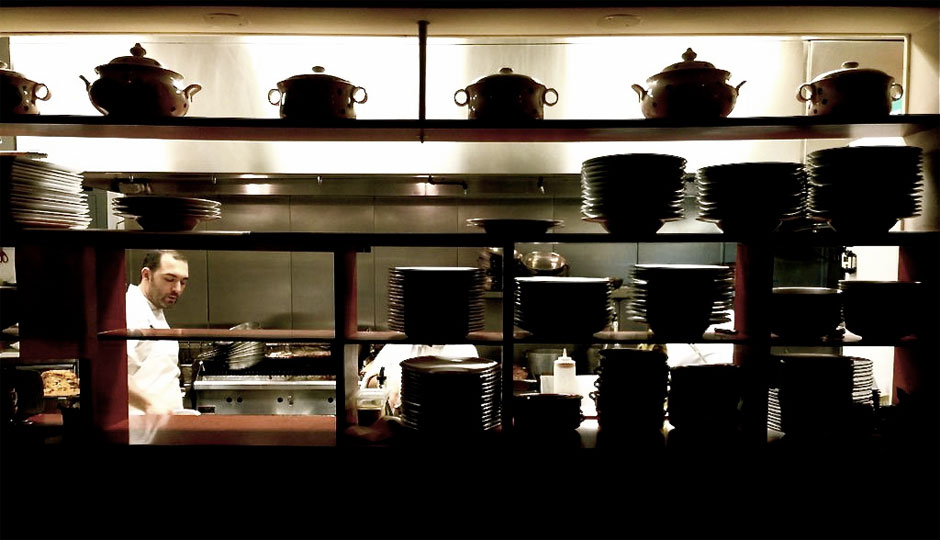Taking a Stand for Immigrants and Undocumented Workers at Le Virtù

Photo by Alex Tewfik
Look, there’s a long story to this and there’s a short one. A complicated one and a simple one.
The short, simple version is this: On March 15, Le Virtù is hosting a dinner to benefit PAUWR (Popular Alliance for Undocumented Workers’ Rights), a group working toward gaining legal status for this group. Chef Joe Cicala and his sous chef, Poli Sanchez, will be working together to create a four-course “Sanctuary Supper” with a menu where each course includes both a Mexican and an Italian component. The dinner, including a wine pairing, starts at 6:30pm and will cost you $120 per person (not counting tax or tip), and all profits will go to PAUWR as part of a national fund-raising campaign to help them continue to fight in what is becoming an increasingly adversarial political environment.
You wanna help? Go eat dinner. That’s the simple version. But like so many things these days, the motivations behind it are complicated. Why Le Virtù is doing this dinner, how they got connected with PAUWR and why owner Francis Cratil Cretarola thinks that this kind of event at this time in history is so important? That’s the long story.
I received this in the mail from Francis yesterday. I’m running it here unedited, almost in its entirety, because he can tell this story and lay out the stakes far better than I can.
“Le Virtù is dedicated to the people of Abruzzo and to the diaspora from the region and the rest of southern Italy that settled our South Philadelphia neighborhood. And its existence and operation are owed to immigrants, and not just those from Italia.
My Abruzzese grandfather, Alfonso Cretarola, arrived at the port of Boston in 1909. He was seventeen. According to federal records, he was one of 183,218 Italians to arrive in the U.S. that year. The year before, 128,503 paesani had arrived. The year after brought 215,537 more. The overwhelming majority of these immigrants were from the southern regions that comprised the former Kingdom of the Two Sicilies, which extended from Abruzzo south to Calabria and Sicilia. Like most Italian arrivals, Alfonso was escaping the endemic poverty, lack of opportunity, and deprivation of the South. After the unification of Italy in 1861, the phrase often used to describe the southern condition under their northern rulers was “brigantaggio prima, emigrazione poi,” brigandage (the disparaging term for armed resistance) first, and then emigration. Alfonso came to America, he told me, not only to help himself but also to help his family.
There were three boys from the town of Castiglione Messer Raimondo, Abruzzo on the S.S. Cretic when it reached shore. They were sharing seventeen dollars between them, according to the ship records. In Boston, they went their separate ways. Alfonso moved to Pennsylvania’s anthracite coal country, mined for a short time (he didn’t like it), and then found day work doing physical labor. Attitudes about Italians at the time barred many possibilities for him, so he changed his name to Francis Cratil. I’m named after him. Eventually he settled in the Italian quarter of Reading, PA, and went to work for Firestone.
The Immigration Restriction Act of 1921 severely limited the number of southern and eastern Europeans who would be admitted to the U.S. The 1924 act doubled down on this (and outright banned the immigration of Arabs and Asians). Italian immigration fell from an average of 200,000 per year to a maximum 4,000. By contrast, the quota for Germans was 57,000.
My mother-in-law, born May Chen, arrived in the U.S. on a student visa in 1953. She took trains from the West Coast to Pennsylvania and Wilkes College (now Wilkes University), in Wilkes Barre. She was one of very few Asians–she doesn’t remember any others–at the college or in the town at that time. People would stop in their tracks (she believes out of sheer surprise) when they saw her on the street.
[Where] Alfonso eventually found a community to support him, May was on her own. She overcame difficulties with the language, adapted to the 1950’s culture, and graduated from the college. May had been sent to the U.S. after Mao toppled Chang Kai Shek’s government. The family had been forced to relocate to Taiwan. Members of her family had played a role in the war against Japan, working with General “Vinegar Joe” Stilwell, and Clair Chennault, the leader of the Flying Tigers. May was a quick study and worked her way up in stock trading in New York City. She and Cathy [May’s daughter, Francis’s wife and co-owner of Le Virtu] would live in Bayside, Queens, before relocating to north Jersey.
Le Virtù was inspired by Alfonso, who lived in my home when I was a child. May was our only other investor, and we owe her Le Virtù’s existence and survival, particularly through the rough times of the 2008 economic crash. When we are down, she picks us back up. So our restaurant was inspired by one immigrant and made possible by another.
Like many restaurants in the U.S., Le Virtù operates on a daily basis thanks to the dedication and hard work of immigrants. Most of these are from Puebla, Mexico. Chef Cicala’s entire kitchen staff is comprised of amazing cooks from Puebla, which has a tradition for producing them. When Joe is not in the kitchen, Poli Sanchez, who arrived in the U.S. while in his teens, helms the staff and seamlessly creates the specialties of my grandfather’s region. Poli has been with us since 2010. We played a small role in helping him earn his green card. Our front- and back-of-house crew has included immigrants from Mexico, Nicaragua, Canada, and Italy. Many have been with us for the better part of a decade. They have treated Le Virtù with care and love, and they have become family.
If Alfonso was to arrive in the U.S. today, he would be denied entry. Period. This is true for the overwhelming majority of Italian-Americans who came during the period of mass immigration. When we talk of their “legal” immigration, we are talking about a period before stringent restrictions existed, before 1924. If they wanted to get here today, they’d have to come illegally. And, facing the same deprivation and lack of opportunity, we all know they would.
Let’s talk about the elephants in the kitchen and dining room. Over 20% of cooks working in the U.S. are undocumented immigrants. A large portion of front-of-house staffs are in the same situation (overall, they comprise about 10% all restaurant employees). Many of them have been working and living in the U.S., raising children born here, and have no way forward to become legal. They pay taxes, often work several jobs, and do everything asked of them. This industry, and several others, wouldn’t survive without them. But we’re not supposed to talk about it.
Cristina Martinez and Ben Miller, the owners and operators of the acclaimed South Philly Barbacoa (named in 2016 as number 6 on Bon Appetit’s list of the country’ best new restaurants), do talk about it. We believe courageously. Cristina is, herself, an undocumented immigrant. In 2009, she made the harrowing journey from Mexico across the desert to the U.S. She crossed over to provide for her family, especially her daughter who is attending nursing school in Mexico. Since her arrival, she has never stopped working. She and Ben met while working in the kitchen of a prominent Philadelphia restaurateur. They married shortly after. They began their enterprise, making the delicious street food of Cristina’s home, in their apartment. That progressed to a food cart, located near their S. 8th Street home, and then to their current South 11th Street brick-and-mortar location. Because Cristina was caught trying to cross in 2006, she is ineligible for a green card despite her marriage to Miller, who is originally from Easton. To qualify for a green card, she’d have to return to Mexico and wait ten years. Many like her are in similar situations, contributing to our economy, not only working but often creating businesses, but trapped in a limbo.
Cristina and Ben started the drumbeat to create a path forward for immigrants in this situation. They have helped create PAUWR (Popular Alliance for Undocumented Workers’ Rights). The organization advocates for legislation to establish legal status for these workers and attempts to educate the public about the unsustainability of the current situation. We’ve been asked to help them raise funds for a national push for this change. Reform of this type is supported by organizations as diverse as Sanctuary Restaurants (of which we are members), and The National Restaurant Association. If you’ve dined out in almost any American city or town, there’s a very good chance that, somewhere along the line, an undocumented immigrant played a role in your meal.
It’s time we talk about that.”
Yeah, it is. And maybe this dinner can be a place to start. Because while there may be battles happening in many quarters right now, discussions over immigration and workers’ rights are central to our restaurant economy. And unless you want to spend the rest of your days eating Spaghettio-O’s and Hungry Man dinners on your couch, it’s something we’re going to have to get right.
So make your choice. You can come down on the side of dignity, decency, humanity and fairness or you can make sure your can opener is in good working order. Your call.
PAUWR [Official]
Sanctuary Restaurants [Official]
Le Virtu [f8b8z]


